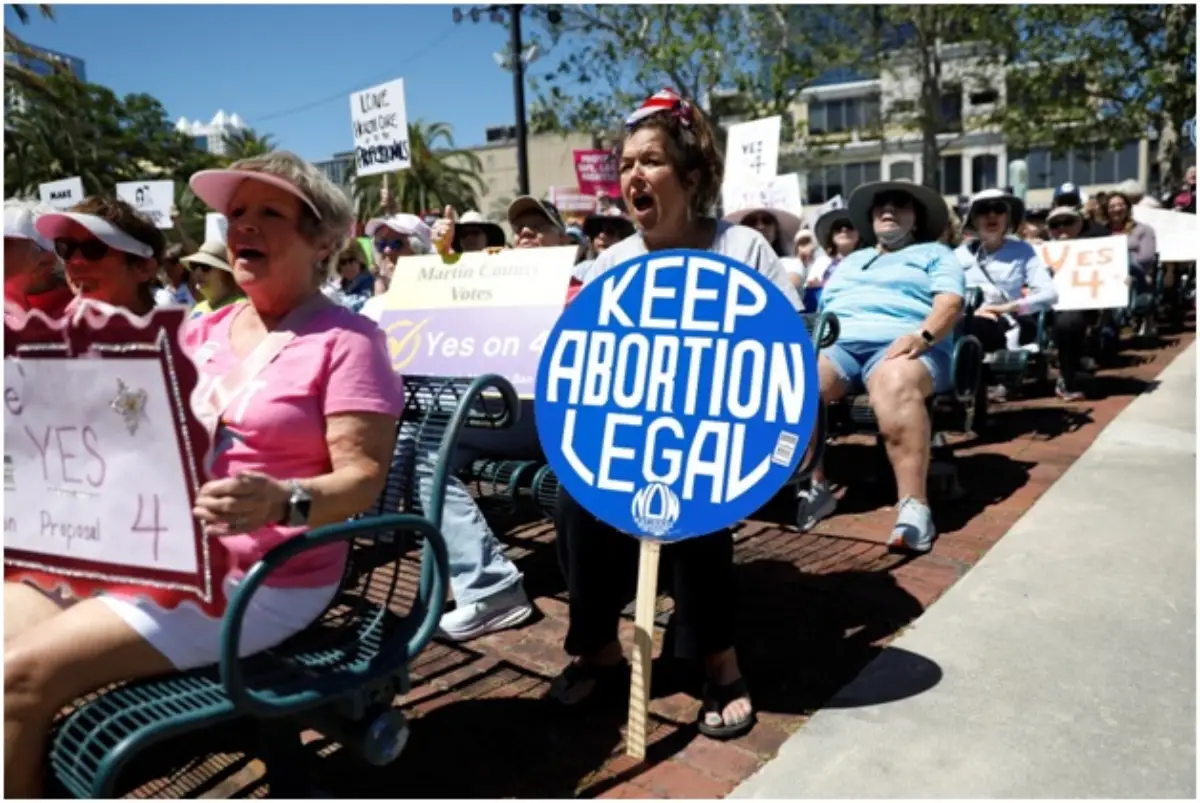
States Where Abortion Could Appear On The Ballot
Photo: Reuters Octavio Jones
WASHINGTON, DC (REUTERS) – Abortion will be on the ballot in at least eight states, including battleground states likely to play critical roles in the presidential race and the fight for control of Congress.
Democrats, led by Kamala Harris, the party’s presidential candidate, have sought to build support for the measures, which they hope will galvanize left leaning and independent voters. Harris faces Republican Donald Trump in the election.
The states where voters will decide whether to guarantee abortion rights include Arizona and Nevada, which are not only likely to be among the states that decide the presidential contest but also feature high-profile Senate races that could determine which party controls that chamber.
The issue has bedeviled Republicans since the Supreme Court’s 2022 decision to eliminate a nationwide right to abortion. Anger over the ruling was widely credited with limiting Republican gains in the 2022 midterm elections, as well as boosting Democrats performance in state races in Kentucky and Virginia last year.
Voters have chosen to protect or expand abortion access in all seven statewide ballot measures put to a vote since the court’s decision, including in conservative strongholds such as Ohio, Kentucky and Kansas.
Here are the states where abortion will be on the ballot as well as other states where the issue may still go before voters.
Arizona
Election officials have approved a ballot measure that would amend the state constitution to guarantee abortion rights up to fetal viability, generally considered to be around 23 or 24 weeks. The coalition of reproductive rights groups backing the initiative, Arizona for Abortion Access, had submitted more than 823,000 signatures, more than double the approximately 384,000 needed for the measure to qualify. President Joe Biden narrowly won the state over Trump in 2020, the first Democrat to carry it in 24 years, and polls show it is once again a close contest between Harris and Trump.
The state’s race for an open Senate seat between Democrat Ruben Gallego and Republican Kari Lake is one of a handful expected to determine which party controls the Senate. Abortions in Arizona are currently subject to a 15-week ban those Republican lawmakers passed in 2022 after the U.S. Supreme Court decision.
Florida
The state Supreme Court on April 1 approved a ballot measure, backed by reproductive rights groups, asking voters whether to amend the state constitution to protect abortion access.
In a separate ruling, the court upheld the state’s existing 15-week abortion ban, a decision that also allowed a more stringent six-week limit to take effect on May 1.
Unlike in most states, constitutional amendments in Florida must pass with at least 60% of the vote, a higher threshold of support than any statewide abortion measure has yet received.
Once a perennial battleground state, Florida has leaned Republican in recent elections, voting twice for Trump and electing Governor Ron DeSantis in a landslide in 2022. But Democrats believe they may be able to put Florida back in play in November.
Nevada
State officials approved a referendum for November that would amend the state constitution to protect abortion rights, after a coalition of reproductive rights groups submitted enough valid signatures. State law already offers similar protections but adding them to Nevada’s constitution would make it harder to roll those rights back.
Nevada is expected to be a battleground state in the presidential contest, while the Senate race between incumbent Democrat Jacky Rosen and Republican challenger Sam Brown is one of the most closely watched of 2024.
Others
Voters in Missouri and South Dakota – both deeply conservative states where virtually all abortions have been banned – are set to decide whether to add abortion rights to their state constitutions.
Missouri’s secretary of state said on August 13 that organizers had submitted enough valid signatures to qualify a ballot measure for November’s election.
South Dakota’s top election official had announced in May that her office had validated enough signatures to place the measure on the ballot. An opposing group has filed a lawsuit challenging the petitions, though it is unlikely to be resolved ahead of the election.
Voters in Nebraska could face two competing ballot measures. One would add a right to abortion to the state constitution; the other would enshrine the state’s current 12-week ban – with exceptions for rape, incest and the life of the mother – into the constitution. In the unlikely event that both measures pass, the one that gets the most affirmative votes would take precedence, according to state officials.
In Arkansas, where abortion is outlawed, the top election official rejected the petitions submitted to qualify an abortion rights measure for November’s ballot, saying organizers failed to provide required paperwork. The group that filed the petitions, Arkansans for Limited Government, disputed that conclusion and has sued the state.
A constitutional amendment will also be on the ballot in Colorado and would need 55% support to pass. In Montana, advocates in June submitted nearly twice as many signatures as required for an abortion rights referendum.
Both of those states currently permit abortions, but supporters say adding protections to the state constitutions would ensure lawmakers or courts could not limit abortion rights in the future. While not a presidential battleground, Montana has a highly competitive U.S. Senate race this year between Democratic incumbent Jon Tester and Republican challenger Tim Sheehy.
Lawmakers in two other states have approved abortion-related amendments for November’s ballot: New York and Maryland. In both states, abortion is already legal under state law; the referendums would amend their state constitutions to add additional protections.




